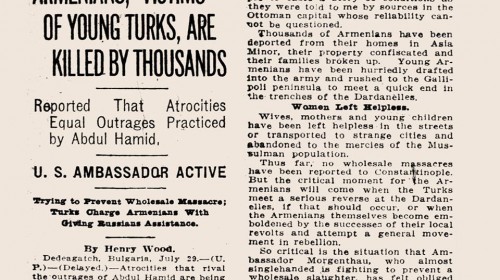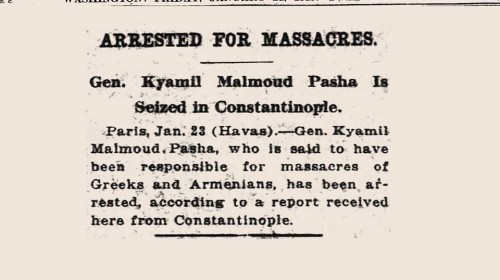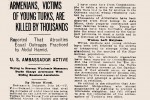SENATE APPROPRIATORS REAFFIRM SUPPORT FOR KARABAKH AID PROGRAM
Express Concern about "Democracy, Human Rights, and Corruption in Azerbaijan"
July 9, 2015WASHINGTON, DC – The U.S. Senate Appropriations Committee, today – following the lead of Senator Mark Kirk (R-IL) – voiced their continued support for direct U.S. aid to Nagorno Karabakh, a program that has, with bipartisan backing, provided humanitarian aid to the citizens of the Nagorno Karabakh Republic since 1998, reported the Armenian National Committee of America (ANCA).
“We want to thank Senator Mark Kirk for his leadership in support of the Nagorno Karabakh aid program,” said ANCA Chairman, and Illinois resident, Ken Hachikian. “This aid program meets pressing humanitarian needs and stands as a powerful statement of American solidarity with the democratic aspirations of the citizens of Artsakh. We were very pleased that Senator Kirk was able to work so successfully with Chairman Graham and his other colleagues on this vital matter.”
The report accompanying the Fiscal Year 2016 (FY16) State-Foreign Operations appropriations bill states that: “The Committee recommends assistance for victims of the Nagorno-Karabakh conflict in amounts consistent with prior years, and for ongoing needs related to the conflict. The Committee urges a peaceful resolution of the conflict.” The legislators also approved report language stressing the importance of continuing and expanding demining efforts in the interior (non-border) regions of Artsakh, including in farmlands and residential areas previously considered off-limits. “The Committee recognizes that Nagorno-Karabakh has a per capita landmine accident rate among the highest in the world, and that mine clearance programs have been effective where implemented. The Committee is concerned with territorial restrictions placed on demining activities in the region and recommends continued funding for, and the geographic expansion of, such programs.”
The Appropriations Committee, in a departure from a recent trend away from setting country-specific aid levels, made specific recommendation of $20.06 million in economic aid to Armenia, $1.7 million in foreign military financing and $600,000 for International Military Education and Training (IMET). Azerbaijan and Georgia were allocated $8.778 million and $54 million in economic assistance, respectively. As in previous years, Senate Appropriators called for parity in military assistance to Armenia and Azerbaijan.
The report makes special mention that the Appropriations Committee is concerned about “democracy, human rights, and corruption in Azerbaijan,” and calls for the State Department to submit a report detailing their efforts to seek the “release of prisoners of conscience in Azerbaijan, including Khadija Ismayilova, Anar Mammadli, Leyla and Arif Yunus, Rasul Jafarov, and Initigam Aliyev.” These concerns were echoed in a letter to Azerbaijani President Aliyev, spearheaded by Senate Democratic Whip Dick Durbin (D-IL) and cosigned by over 15 Senate colleagues, calling for a “more tolerant environment for free media like RFE/RL and to immediately release those journalists, activists and civil society leaders currently detained.”
$195 million Allocation for Syria
The Senate Appropriations Committee addressed the ongoing crisis in Syria with a $195 million allocation for in-country efforts and additional funds for ongoing refugee assistance in Jordan, Lebanon and Turkey. The in-Syria assistance will also fund a “new program to build the capacity of Syrian diaspora-led organizations and local Syrian civil society to address the immediate and long-term needs of the Syrian people inside Syria.” Armenia was not identified as a specific target for assistance to help transition those fleeing Syrian conflict, despite the fact that as many as 17,000 have fled to Syria to Armenia.
The House Appropriations Committee considered its version of the foreign aid bill in June, staying silent on a majority of Armenian American foreign aid priorities. Following full House and Senate consideration of their respective measures, appropriators from both houses of Congress hope to convene a conference to work out differences, prior to sending a reconciled version of the legislation to the President for signature. Alternately, if they fail to get to the conference phase of this process, legislative leaders may roll foreign aid spending into a larger omnibus spending measure.
Earlier this year, the ANCA’s Kate Nahapetian testified before the House Appropriations Subcommittee, outlining the Armenian American community’s foreign aid priorities. Video of Nahapetian’s presentation is available at:
In February, the Obama-Biden Administration released its FY2016 budget which calls for yet another reduction in U.S. economic assistance to both Armenia and Azerbaijan, while maintaining parity in appropriated military aid to these two countries.
The President’s proposal of $18,360,000 in Economic Support Funds for Armenia in Fiscal Year (FY) 2016 would, if approved by Congress, represent a record low in such aid since Armenia’s independence. The White House’s proposal for Armenia is over $2 million less than FY 2014’s actual economic aid allocation, and less than half of the $40 million requested in a Congressional Armenian Caucus letter and ANCA Congressional testimony submitted last year.
#####







